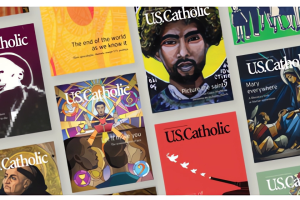UPDATE: After posting this story, U.S. Catholic received the following statement from Joseph J. Fahey, chair of Catholic Scholars for Worker Justice: "The Catholic Scholars for Worker Justice letter was sent out by us and us alone. It was not sponsored in any way by Faith in Public Life. Some of us did sign their original petition but this project was ours and ours alone. We do not have any ties with Faith in Public Life or their funding sources."
c. 2014 Religion News Service
(RNS) A group of leading Catholic activists and academics has renewed criticism of Catholic University of America over a large gift from the billionaire industrialist and conservative funder Charles Koch, and over a school official’s statements that seem to endorse Koch’s questioning of climate change and the right of public workers to unionize.
In a letter sent on Monday (Feb. 10) to CUA President John Garvey and Andrew Abela, dean of CUA’s new business school, more than 50 Catholic signatories said Charles Koch and his brother, David, “have a clear political and ideological agenda.”
The Kochs’ libertarian-leaning positions, they said, “are in direct conflict with traditional Catholic values.”
CUA’s announcement last fall that the Koch Foundation had given $1 million to the School of Business and Economics to fund lecturers and courses in “principled entrepreneurship” sparked concern among some faculty and champions of Catholic social teaching.
In December, dozens of them wrote to Garvey and Abela expressing concern that “by accepting such a donation you send a confusing message to Catholic students and other faithful Catholics that the Koch brothers’ anti-government, Tea Party ideology has the blessing of a university sanctioned by Catholic bishops.”
CUA, based in Washington, has an especially high profile in part because it sits in the nation’s capital and it operates under the aegis of the U.S. bishops.
The university responded with unusually pointed and personal criticisms of the signatories, calling them “presumptuous” and accusing them of trying to “to manufacture controversy and score political points.”
Abela, who is an exponent of conservative free-market policies that are gaining traction in some Catholic circles, also gave an interview in which he said that “Catholic social teaching says nothing” about public sector unions. He also said that while Catholic teaching affirms respect for the environment, “it doesn’t say if you question global warming or climate change that’s a sin.”
Joseph Fahey, head of Catholic Scholars for Worker Justice and chief organizer of the latest letter, said the assertions were misleading when it came to long-standing church teaching on unions and misconstrued repeated church and papal pronouncements on the environment.
“In the face of growing threats to workers’ rights, Catholic university leaders should be especially mindful not to give moral cover to well-funded anti-union activists,” Fahey said. “It’s essential that universities protect Catholic identity when it comes to worker justice and the common good.”
The critics’ letter noted that Pope Francis has been outspoken on the Christian duty to protect the environment — a cause the Koch brothers have strongly opposed.
On global warming it also quotes former Pope Benedict XVI, who wrote: “Can we remain indifferent before the problems associated with such realities as climate change, desertification, the deterioration and loss of productivity in vast agricultural areas, the pollution of rivers and aquifers?”
CUA said that it would have no statement beyond its response last December to the initial letter.
Other CUA defenders have said the Koch critics are themselves tainted because they received help in publicizing the letter from the progressive religious lobby Faith in Public Life, which receives some funding from the Open Society Institute backed by liberal-leaning billionaire George Soros.
Faith in Public Life says it receives about $200,000 a year from Open Society, about 13 percent of its annual budget. Officials there say they work with Catholic leaders in support of Catholic teaching, whereas Koch money is used to oppose Catholic teaching.











